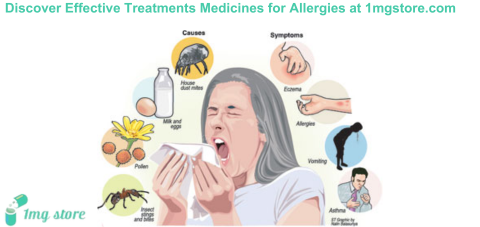
Allergy
-
Generic: Beclomethasone DipropionateEquivalent Brand: Beclovent Inhaler1 Inhaler$21.00
-
Generic: Azelastine + Fluticasone PropionateEquivalent Brand: Astelin1 Spray (70 Doses)$10.50
$63.8 -
Generic: Fluticasone FuroateEquivalent Brand: Veramyst1 Nasal Spray (120 Doses)$16.00
-
Generic: SalmeterolEquivalent Brand: Serevent30 Rotacap/s$3.80Out of stock
-
Generic: FormoterolEquivalent Brand: Perforomist5 Respule/s$8.10
-
Generic: Mometasone FuroateEquivalent Brand: Nasonex1 Nasal Spray (100 Doses)$15.94
-
Generic: Fluticasone PropionateEquivalent Brand: Flonase1 Spray (120 Doses)$19.50
-
Generic: Fluticasone PropionateEquivalent Brand: Flovent20 Respule/s$44.00
-
Generic: Fluticasone PropionateEquivalent Brand: Flovent1 Spray (100 Doses)$15.00
-
Generic: Cetirizine HclEquivalent Brand: Zyrtec30 Tablet/s$4.80
-
Generic: Azelastine HclEquivalent Brand: Astelin1 Nasal Spray$15.74
-
Generic: FexofenadineEquivalent Brand: Allegra30 Tablet/s$14.00
Navigating Allergies: The Crucial Role of Allergy Medicines in Restoring Wellness
Introduction:
In the intricate web of human health, allergies stand as pervasive challenges that affect millions worldwide. Whether triggered by environmental factors, food substances, or other allergens, allergic reactions can range from mild discomfort to severe and potentially life-threatening responses. The category of Allergy Medicines emerges as a critical ally in the battle against allergies, offering relief, management, and prevention of symptoms. This comprehensive guide explores the importance of Allergy Medicines, unraveling the complexities of allergies, their impact on individuals, and the pivotal role these medications play in restoring wellness.
Understanding Allergies:
Allergies represent hypersensitive responses of the immune system to substances that are typically harmless. Common allergens include pollen, dust mites, pet dander, certain foods, insect venom, and medications. When an allergic individual comes into contact with an allergen, the immune system perceives it as a threat and releases chemicals, such as histamines, leading to the manifestation of allergic symptoms.
The Importance of Allergy Medicines:
Relief from Symptoms:
Allergy symptoms can vary widely, encompassing sneezing, itching, watery eyes, nasal congestion, skin rashes, and even life-threatening anaphylaxis in severe cases. Allergy Medicines, including antihistamines, decongestants, and corticosteroids, provide targeted relief from these symptoms, allowing individuals to regain comfort and resume their daily activities.
Preventing Anaphylaxis:
For individuals with severe allergies, exposure to specific allergens can trigger a rapid and potentially life-threatening reaction known as anaphylaxis. Allergy Medicines, such as epinephrine auto-injectors, are indispensable in these cases, providing swift intervention to counteract the severe symptoms and potentially save lives.
Managing Chronic Conditions:
Chronic conditions like allergic rhinitis (hay fever), eczema, and asthma can significantly impact an individual's quality of life. Allergy Medicines play a crucial role in managing these long-term conditions, alleviating symptoms, and preventing exacerbations that could lead to more severe health issues.
Addressing Seasonal and Environmental Allergies:
Seasonal allergies, triggered by pollen, mold spores, or other environmental factors, can be particularly challenging. Allergy Medicines offer seasonal relief, allowing individuals to navigate these periods with reduced symptoms and an improved quality of life.
Enhancing Respiratory Health:
Allergies affecting the respiratory system, such as allergic rhinitis and asthma, can compromise respiratory function. Medications like bronchodilators and inhaled corticosteroids play a pivotal role in enhancing respiratory health, reducing inflammation, and improving airflow.
Improving Sleep and Productivity:
Allergies can disrupt sleep patterns, leading to fatigue and decreased productivity. Allergy Medicines that alleviate symptoms contribute to better sleep quality, allowing individuals to wake up refreshed and engage more effectively in their daily activities.
Customized Treatment Plans:
Allergy Medicines offer a range of options, allowing healthcare professionals to tailor treatment plans to individual needs. From oral medications to nasal sprays and eye drops, the versatility of available treatments ensures that individuals receive targeted relief for their specific symptoms.
Preventing Allergic Sensitization:
Early intervention with Allergy Medicines can prevent the progression of allergic sensitization. By addressing symptoms promptly, these medications may reduce the risk of individuals developing more severe allergies over time.
Educating and Empowering Patients:
Allergy Medicines empower individuals to take control of their allergy management. Understanding how and when to use these medications, as well as recognizing potential triggers, is an essential aspect of allergy education that enhances patient autonomy.
Contribution to Overall Well-Being:
By providing relief from allergic symptoms, preventing complications, and supporting overall health, Allergy Medicines contribute to the holistic well-being of individuals affected by allergies. The ability to enjoy a symptom-free life is a significant factor in promoting mental and emotional wellness.
Conclusion:
In conclusion, the importance of Allergy Medicines in the landscape of healthcare is undeniable. As we navigate the complexities of allergies and their diverse manifestations, these medications emerge as indispensable tools for providing relief, managing chronic conditions, and improving overall quality of life. By addressing the multifaceted challenges posed by allergies, these medicines play a pivotal role in restoring wellness and enabling individuals to lead healthy, fulfilling lives despite the presence of allergic sensitivities.


